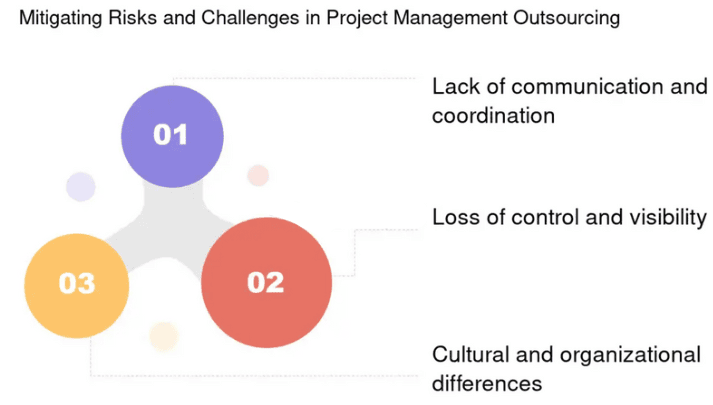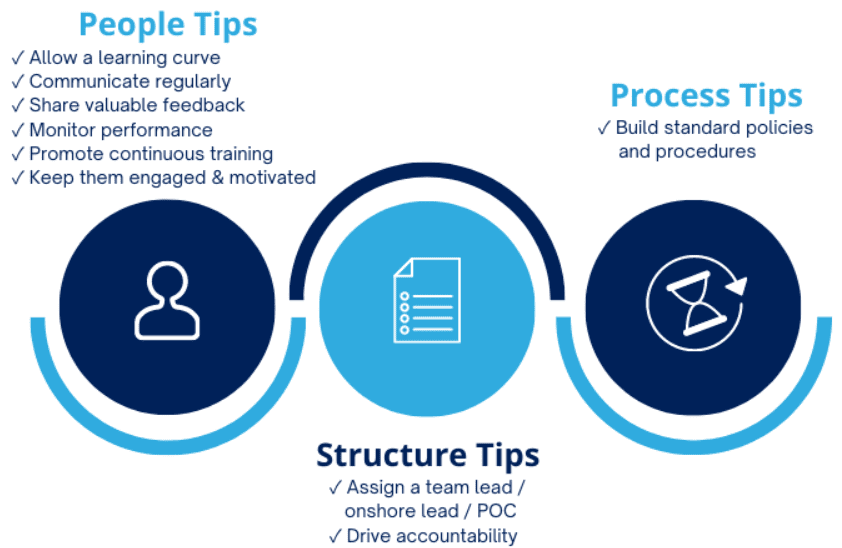The rise of globalization and digital connectivity has fundamentally transformed the landscape of business operations, making remote work and global outsourcing increasingly prevalent. Businesses are now presented with unprecedented opportunities to access specialized talent, reduce costs, and expand their market reach by outsourcing operations to remote teams across the globe. However, navigating this complex landscape requires careful consideration of key factors and the implementation of effective management practices. This article aims to shed light on the essential elements of successful global outsourcing, focusing on the critical factors to look for and the global practices that help manage outsourced remote teams. We will delve into the intricacies of implementing agile methodologies, including Scrum sprints, quarterly planning, and agile boards, to optimize remote team performance. Furthermore, we will explore the importance of clear communication, cultural sensitivity, and robust risk management strategies. Bpohub.com serves as a valuable resource for businesses seeking to establish successful outsourcing partnerships, connecting them with experienced providers and offering insights into best practices.
Navigating the Global Outsourcing Landscape:
"Global outsourcing presents a myriad of benefits, including access to a diverse pool of talent, cost efficiencies, and the ability to operate around the clock. However, it also introduces unique challenges, such as cultural differences, time zone disparities, and communication barriers. Successful global outsourcing initiatives require meticulous planning, thorough due diligence, and a deep understanding of the cultural nuances of the regions involved. Technology plays a pivotal role in facilitating remote collaboration, with video conferencing, project management tools, and instant messaging platforms enabling seamless communication and workflow management. Consider a software development company that outsourced its QA testing to a team in Eastern Europe. By implementing clear communication protocols and utilizing agile methodologies, they were able to maintain high-quality standards and meet project deadlines.
Key Factors in Outsourcing Operations:
"When considering outsourcing operations, several key factors must be thoroughly evaluated to ensure a successful partnership. The reliability and expertise of the outsourcing partner are paramount. Businesses should conduct comprehensive due diligence, including reviewing past performance, client testimonials, and technical capabilities. Clear and transparent communication is essential for maintaining alignment and addressing potential issues promptly. Data security and compliance are non-negotiable, particularly when dealing with sensitive information. Outsourcing partners must adhere to stringent security protocols and regulatory requirements. Scalability and flexibility are crucial for adapting to changing business needs and market demands. Cost-effectiveness is a significant driver of outsourcing, but it should not be the sole determinant. Service level agreements (SLAs) should be clearly defined to establish performance expectations and accountability. Implementing a pilot program can provide valuable insights into the partner's capabilities and compatibility before committing to a long-term contract.
Implementing Agile Methodologies for Remote Teams:
Agile methodologies, such as Scrum, provide a structured framework for managing remote teams and ensuring project success. Scrum sprints, with their short, iterative cycles, enable remote teams to maintain focus and deliver incremental value. Daily stand-ups, sprint planning, and retrospectives facilitate communication, collaboration, and continuous improvement. Tools like Jira or Trello provide a centralized platform for managing tasks, tracking progress, and visualizing workflow. Quarterly planning involves aligning remote team goals with overall business objectives, creating clear project road-maps, and establishing milestones. Agile boards, such as Kanban boards, provide a visual representation of the workflow, allowing remote teams to track progress, identify bottlenecks, and manage dependencies. Broader timelines should be established to provide a high-level overview of project milestones and deliverables. Cross functional teams should have clear lines of communication, and responsibilities.

Global Practices for Effective Remote Team Management:
Effective remote team management hinges on establishing robust communication and collaboration strategies. In a globalized context, this necessitates leveraging a diverse range of tools and platforms, including video conferencing, instant messaging, and sophisticated project management software. Regular virtual meetings, both scheduled and ad-hoc, are essential for maintaining alignment and addressing emerging issues. Clear communication protocols and expectations should be established from the outset, outlining preferred communication channels, response times, and escalation procedures. Time zone differences, a common challenge in global outsourcing, require careful consideration. Implementing flexible work schedules and overlapping meeting times can help mitigate these challenges. Cultural sensitivity is another crucial aspect of remote team management. Understanding and respecting cultural differences fosters trust, enhances collaboration, and minimizes misunderstandings.
Team-building activities, even in a virtual environment, are essential for fostering a sense of camaraderie and belonging. Virtual icebreakers, online team games, and virtual social events can help build relationships and strengthen team cohesion. The onboarding process for remote team members should be comprehensive, providing them with the necessary tools, resources, and training to succeed. Performance monitoring and feedback should be ongoing, utilizing performance metrics and regular check-ins to track progress and identify areas for improvement. Creating a virtual team culture that promotes open communication, collaboration, and mutual support is essential for fostering a positive and productive remote work environment. This can be achieved through regular team meetings, virtual social events, and recognition programs.

Mitigating Risks and Ensuring Success:
Global outsourcing, while offering significant benefits, also introduces inherent risks that must be proactively addressed. Risk management strategies are essential for identifying and mitigating potential challenges. Conducting thorough risk assessments, developing contingency plans, and establishing clear escalation procedures can help minimize disruptions and ensure business continuity. Security risks, particularly data breaches and cyberattacks, are a major concern in global outsourcing. Implementing robust security measures, such as data encryption, access controls, and regular security audits, is crucial for protecting sensitive information. Continuous improvement and feedback are essential for optimizing remote team performance. Conducting regular performance reviews, soliciting feedback from team members, and implementing process improvements can help enhance efficiency and effectiveness. Technology plays a pivotal role in enhancing remote team management. Utilizing advanced project management tools, communication platforms, and collaboration software can streamline workflows, improve communication, and enhance productivity. Measuring the success of an outsourced remote team requires establishing clear performance metrics and tracking progress against defined goals. Key performance indicators (KPIs), such as project completion rates, customer satisfaction scores, and cost savings, can provide valuable insights into team performance. Regularly reviewing and analyzing these metrics allows businesses to identify areas for improvement and make informed decisions. For a deeper understanding of project management best practices, refer to resources provided by the Project Management Institute.
Conclusion:
In today's interconnected world, global outsourcing offers businesses a powerful strategy for accessing specialized talent, reducing costs, and expanding their market reach. However, successful outsourcing requires careful planning, meticulous execution, and effective remote team management. By considering the key factors outlined in this article and implementing global best practices, businesses can maximize the benefits of outsourcing and minimize the associated risks. Agile methodologies, such as Scrum sprints, quarterly planning, and agile boards, provide a structured framework for managing remote teams and ensuring project success. Clear communication, cultural sensitivity, and robust risk management strategies are essential for fostering a positive and productive remote work environment. We encourage you to leverage Bpohub's resources and expertise to navigate the complexities of global outsourcing and establish successful partnerships. Contact Bpohub for a consultation to learn how we can help you optimize your outsourcing operations and achieve your business goals.
